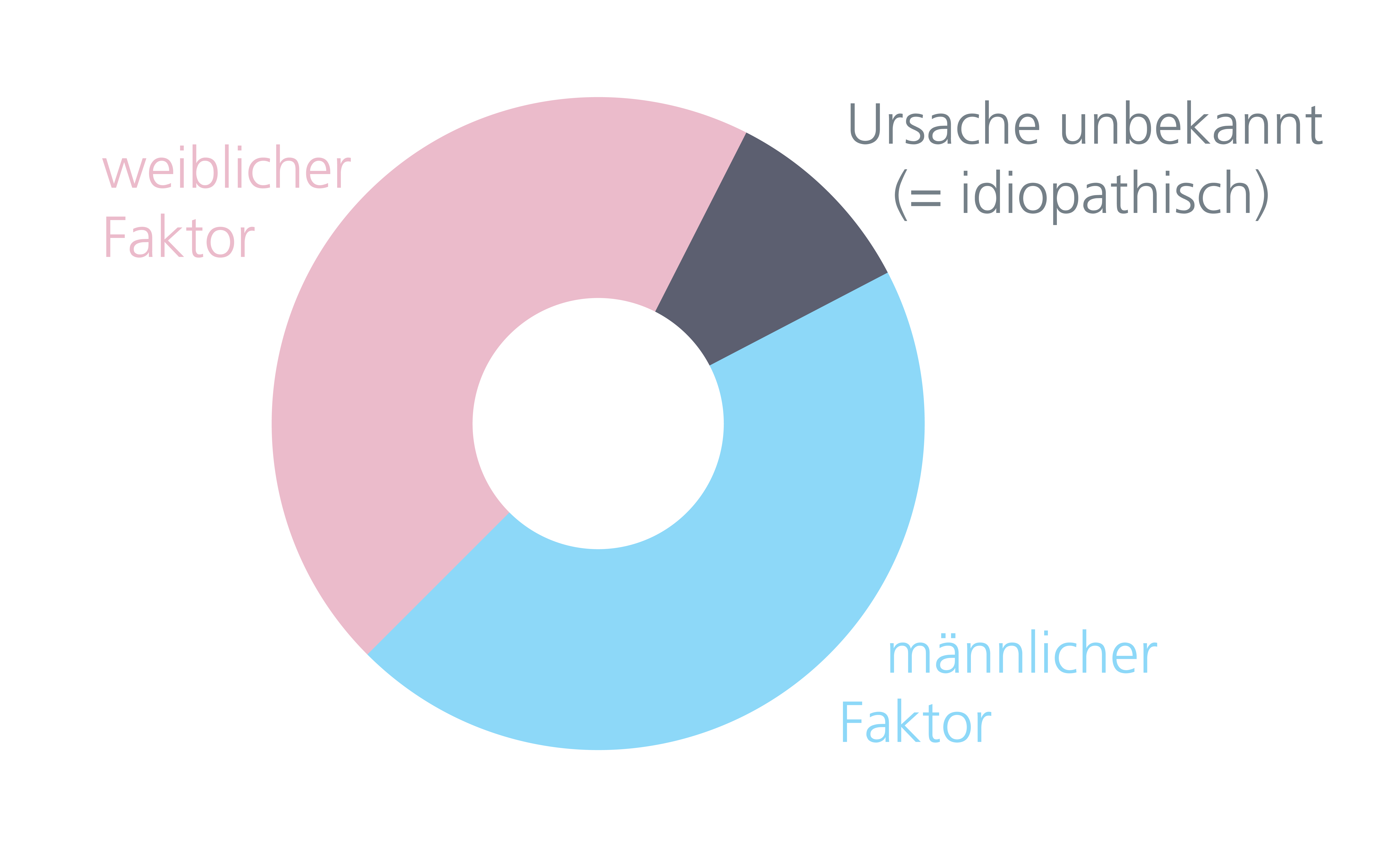Unerfüllter Kinderwunsch
Ursachen der Kinderlosigkeit
Für die meisten Paare erfüllt sich der Wunsch nach einem Kind fast selbstverständlich. Etwa 15-20% aller Partnerschaften sind jedoch ungewollt kinderlos. Die Ursachen dafür verteilen sich zu 45% auf die Frau und 45% auf den Mann. Oftmals sind Störfaktoren bei beiden Partnern zu finden. Ein immer kleiner werdender Teil (da die Diagnostik immer besser wird) der ungewollten Kinderlosigkeit ist noch nicht abgeklärt (sogenannte idiopathische Sterilität).
│ © 2021 Next Fertility IVF Prof. Zech
Ungewollte Kinderlosigkeit kann verschiedene Ursachen, wie beispielsweise hormonelle Störungen, krankhafte Veränderungen in den Organen, sowie schwere Erkrankungen haben. Ferner ist eine ungesunde Lebensführung oftmals dafür verantwortlich.
1. Störung bei der Entstehung von Eizelle und Samenzelle
2. Störung bei der Vereinigung von Eizelle und Samenzelle
3. Störung nach der Befruchtung
1. Störung bei der Entstehung von Eizelle und Samenzelle
Ungewollte Kinderlosigkeit kann ihre Ursache darin haben, dass entweder keine Eizelle (Oogenese) oder nicht genügend Samenzellen (Spermatogenese) heranreifen. Wenn sich keine Eizellen entwickeln, handelt es sich meist um Störungen im Zusammenspiel der verschiedenen hormonbildenden Drüsen (Hypothalamus, Hypophyse, Eierstöcke etc.). Die Art dieser Erkrankung muss zuerst durch Hormon-Untersuchungen herausgefunden werden, um sie danach entsprechend zu behandeln. Das Vorhandensein von Samenzellen wird durch eine mikroskopische Untersuchung der Samenflüssigkeit nachgewiesen (siehe "Samenauswahl"). Zur Befruchtung einer Eizelle (Fertilisierung) sind viele Millionen beweglicher Samenzellen notwendig. Von diesen erreichen jedoch nur wenige den Eileiter. Die Eizelle muss im Eileiter von mehreren 100 Samenzellen umgeben sein, um befruchtet werden zu können. Wenn also zu wenig bewegliche Spermien vorhanden sind, kommt es zu keiner Befruchtung. Die Ursache dafür ist selten durch einen Hormonmangel allein begründet. Meist handelt es sich um Störungen im Hoden selbst, welche sich nicht so leicht behandeln lassen, wie z. B. Eireifungsstörungen bei der Frau. Zur Diagnostik sind spezielle Untersuchungen erforderlich. Mit Hilfe von bestimmten Medikamenten oder durch Hormongaben kann versucht werden, die Anzahl und Qualität der beweglichen Samenzellen zu erhöhen. Zurzeit sind Behandlungsmöglichkeiten bei degenerativen Hodenerkrankungen oder bei genetisch bedingten Störungen leider kaum gegeben.
2. Störung bei der Vereinigung von Eizelle und Samenzelle
Wenn eine Eizelle herangereift ist (Oogenese) und ausreichend bewegliche Samenzellen vorhanden sind, können vielerlei Faktoren die Vereinigung von Ei- und Samenzelle (Befruchtung / Fertilisierung) verhindern. Am häufigsten wird die Verschmelzung der Keimzellen durch krankhafte Veränderungen im Eileiter blockiert. Hierzu zählen Verklebungen nach Entzündungen, Verwachsungen zwischen Eileiter und Eierstock, gänzliches Fehlen der Eileiter nach Operationen, sowie der Eileiterverschluss nach erfolgter Sterilisation. In einzelnen Fällen können Samenzellen im Gebärmutterhalskanal (Cervix uteri) durch immunologische Vorgänge unbeweglich werden.
3. Störungen nach der Befruchtung
Der sich entwickelnde Embryo kann noch vor der Einnistung (Implantation / Nidation) aufgrund ererbter oder spontan entstandener Entwicklungsfehler absterben. Ferner kommt es vor, dass die Gebärmutterschleimhaut (Endometrium) für die Aufnahme des Embryos nicht ausreichend vorbereitet ist. Es gibt auch Fälle, in denen das immunologische Abwehrsystem der Mutter den Embryo als fremd erkennt und abstößt.
Lassen sich weder beim Mann noch bei der Frau medizinische Gründe für eine Kinderlosigkeit finden, so spricht man von ungeklärter oder idiopathischer Sterilität. In solchen Fällen sollten auch psychosomatische Aspekte Beachtung finden, denn es ist möglich, dass seelische Komponenten bestimmte Körperfunktionen beeinträchtigen. Wenn dies zutrifft, ist es empfehlenswert, zunächst eine Aufklärung von psychotherapeutischer Seite zu versuchen, um danach die richtigen Schritte zum Erfolg einzuleiten (siehe "Emotionale Begleitung").
Herauszufinden warum sich Ihr Kinderwunsch bislang nicht erfüllt hat, erfordert eine genaue Abklärung der Ursachen – am besten gleich durch unsere Spezialisten im IVF-Zentrum, die mit einer Reihe von Diagnose- und Therapiemöglichkeiten individuell weiterhelfen können.







